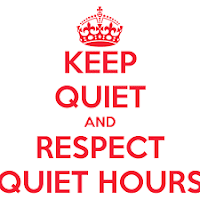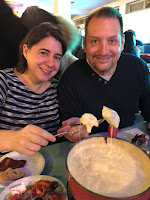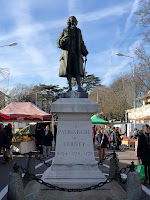 When I first moved here I used to joke around that the metric system was just a fad and that it wouldn't last. Obviously just a joke but it was my way of coping with having to learn an entirely new system of measurement. I have to finally admit that I am fully a metric guy now.
When I first moved here I used to joke around that the metric system was just a fad and that it wouldn't last. Obviously just a joke but it was my way of coping with having to learn an entirely new system of measurement. I have to finally admit that I am fully a metric guy now.
 The British brought the imperial system of measurement to the American colonies and we kept them even after the British left. Today only three countries in the world don't use the metric system - the USA, Liberia, and Myanmar. And Even Liberia has finally pledged to move to the metric system.
The British brought the imperial system of measurement to the American colonies and we kept them even after the British left. Today only three countries in the world don't use the metric system - the USA, Liberia, and Myanmar. And Even Liberia has finally pledged to move to the metric system.
In 1975 the USA passed the Metric Conversion Act which was meant to transition the country to the metric system. The problem was that the law was voluntary and so it never took off.
 I don't think that the USA will ever fully switch to metric for three reasons.
I don't think that the USA will ever fully switch to metric for three reasons.
1. Money. It will cost a ka-jillion dollars to switch. The USA is huge and all of the road signs would need to be changed which would be expensive. Plus speed limit signs, gas pumps would need to be relabelled for litres instead of gallons, car odometers would need to count kilometres instead of miles, household ovens and cookbooks would need to be in Celsius instead of in Fahrenheit, etc.
2. Time. It would take a long time to switch and Americans have a short attention span. The longer something takes the less interest we have in it.
3. Arrogance. Americans in general are a stubborn group. Even if we see the benefits of switching to the system that the rest of the world uses, we still cling to our ways because the rest of the world should be the ones to change.
Getting used to Celsius for temperature was probably the one that I struggled with the longest. I knew that 0℃ was freezing and 40℃ was really hot. My reference point was that 28℃=82℉ (you just switch the numbers).
Celsius does make much more sense. Water freezes at 0℃ and boils at 100℃. Way more user friendly than freezing at 32℉ and boiling at 212℉.
 Normal human body temperature is 37℃ but in the USA we know it as 98.6℉.
Normal human body temperature is 37℃ but in the USA we know it as 98.6℉.
To convert ℃ to ℉: Divide by 5, then multiply by 9, then add 32.
To convert ℉ to ℃: Subtract 32, then multiply by 5, then divide by 9.
For weather, I never convert. I just think in Celsius. Every week my mom tells me what the weather is in Arizona. I give the Brno update but then we have to figure out what it is in Fahrenheit.
The only time that I convert is for Thanksgiving because all of my recipes are in Fahrenheit and my oven only understands Celsius.
Weight was probably the easiest thing to get used to. 1 kg = 2.2 lb. Heck, I'm skinnier in kilos.
 I've had lots of friends over here who have had babies and birth weight was the difficult part for me to wrap my head around. I understand that the average birth weight is 7.5 lb which is 3,5 kg. But the numbers just threw me for a while.
I've had lots of friends over here who have had babies and birth weight was the difficult part for me to wrap my head around. I understand that the average birth weight is 7.5 lb which is 3,5 kg. But the numbers just threw me for a while.
 Volume was pretty easy as well. I think that's mainly because in the USA soda does come in 2 litre bottles.
Volume was pretty easy as well. I think that's mainly because in the USA soda does come in 2 litre bottles.
Czech beer is usually served in 500 ml mugs which is ½ litre. So four beers equal a 2 litre bottle (and a big night at the pub).
 Length had a few challenges for me in the beginning. I had to think a bit differently about height.
Length had a few challenges for me in the beginning. I had to think a bit differently about height.
For distance, my reference for conversion was that 5 km = 3.2 miles. Long distances took a while to get used to. I think the biggest quandary was that meters are bigger than feet but a kilometre is smaller than a mile.
 To remember how many feet are in a mile you have to think of "5 tomatoes" because five to-m8-oes sounds like 5-2-8-0 so there are 5,280 feet in a mile.
To remember how many feet are in a mile you have to think of "5 tomatoes" because five to-m8-oes sounds like 5-2-8-0 so there are 5,280 feet in a mile.
There's no need to remember how many metres are in a kilometre because the entire system is based on 10's so a kilometre is 1000 metres. This is because apparently the imperial measurement was based on a drunk mathematician rolling dice.




































































